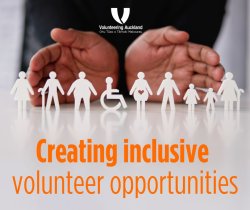Creating Inclusive Volunteer Opportunities in Community Organisations

Volunteering is a cornerstone of strong communities, fostering social connections, skill-building, and support for local causes. For a community organisation, building an inclusive volunteering programme is essential to welcoming a diverse group of volunteers, empowering people from all backgrounds to contribute, feel valued, and strengthen their sense of belonging. Inclusivity in volunteering helps to break down social barriers, providing equitable opportunities for individuals to participate in community life and contribute their skills, perspectives, and passions.
Creating an inclusive volunteer environment doesn’t just happen; it requires thoughtful planning, continuous support, and a commitment to equity. Here are practical ideas for community organisations to develop volunteer programmes that reflect the full diversity of their communities and maximize the positive impact of volunteering.
1. Understand and Address Barriers to Participation
Before a community organisation can build an inclusive programme, it’s essential to identify and understand the barriers potential volunteers may face. Some common challenges include lack of accessible transportation, physical and sensory accessibility needs, language barriers, limited access to digital resources, and time constraints due to family or work obligations. By assessing these barriers, organisations can develop targeted solutions, such as providing transportation assistance, translating key materials, and offering flexible schedules.
Practical Idea:
- Conduct surveys or focus groups to ask people directly about the challenges they face in volunteering. Gathering feedback from people in the community helps to create a better understanding of their needs and shape a volunteer programme that is both accessible and appealing to them.
2. Create Accessible Volunteer Roles
It’s important to design volunteer roles that cater to a variety of skills, schedules, and physical abilities. This can help to open doors for individuals who may otherwise feel that volunteering is out of reach. By creating roles with different levels of time commitment, or that can be done remotely, organisations can make volunteering more accessible to people with different availability and capacities.
Practical Idea:
- Offer a variety of roles that include short-term projects, virtual opportunities, and physically accessible positions. For instance, someone with limited mobility might prefer an administrative role that can be done from home, while others may enjoy being actively involved in community events. This approach allows people to contribute based on their abilities and preferences.
3. Foster a Welcoming Environment for All
For volunteers to feel valued, they need to feel welcomed and appreciated. An inclusive organisation fosters a welcoming environment that respects and celebrates differences in age, culture, background, and experience. This can include providing cultural competency training to volunteer coordinators and staff, as well as encouraging open communication and feedback from volunteers.
Practical Idea:
- Create a warm and respectful onboarding process for new volunteers that includes an introduction to the organisation’s mission, values, and diversity initiatives. Consider pairing new volunteers with a “buddy” volunteer who can offer support, answer questions, and help them feel more comfortable in their new role.
4. Offer Flexibility in Volunteer Rosters
Life is busy, and flexibility is key for many volunteers, especially those with family or work obligations, or who may need to work around health-related limitations. By allowing flexible hours and shifts, organisations can make volunteering more accessible and appealing for individuals who want to participate but have limited time.
Practical Idea:
- Set up a system that allows volunteers to sign up for shifts or roles that work with their schedules. This might involve offering both evening and weekend options, allowing remote work for certain tasks, or providing the option to help out on a project basis rather than committing to a weekly schedule.
5. Provide Skills Development and Training
One way to attract a wider range of volunteers is by offering roles that promote skill-building and personal development. By providing training, an organisation can create a more inclusive programme that empowers people from different backgrounds, especially those who may be looking to gain skills for employment or personal growth. Offering training and development opportunities not only improves volunteer retention but also enhances the volunteers' experience.
Practical Idea:
- Offer workshops and skill-building sessions on topics relevant to the roles. For example, a volunteer interested in administration could benefit from training in data entry, project management software, or public speaking. The organisation can also provide certificates or letters of recommendation to acknowledge their skills development.
6. Embrace Diversity in Recruitment
For an inclusive volunteer programme, recruitment efforts should reach a wide audience and focus on diversity. This includes outreach efforts that go beyond traditional channels, such as working with local cultural organisations, schools, and disability advocacy groups, as well as promoting volunteer opportunities through social media and community newsletters.
Practical Idea:
- Partner with diverse community groups to co-host volunteer events or information sessions, which helps to reach new audiences and increase awareness of volunteering opportunities. Organisations can also use inclusive language in recruitment materials and highlight the value they place on diversity and inclusivity in their volunteer teams.
7. Provide Clear Communication and Support
Clear, accessible communication is essential for fostering inclusivity. All communication, whether verbal or written, should be easy to understand, respectful, and sensitive to cultural differences. For volunteers with limited English skills, offering translated materials or access to translation services can make a world of difference. Additionally, having a point person or coordinator who is available for ongoing support can help to ensure that volunteers feel comfortable and confident in their roles.
Practical Idea:
- Regularly check in with volunteers and encourage open feedback to understand any challenges they may be facing. Establishing an open line of communication helps volunteers feel supported and valued, while also helping the organisation address potential issues proactively.
Conclusion
Inclusive volunteer opportunities are essential for building vibrant, resilient, and supportive communities. By proactively designing volunteer roles, fostering a welcoming culture, and removing barriers, community organisations can create an environment where everyone feels valued and has the chance to participate. Inclusivity in volunteering not only strengthens the organisation and community but also enriches the lives of volunteers, enhancing their sense of belonging, skills, and connections. Through this commitment to inclusivity, community organisations can harness the diverse strengths of their volunteers to drive meaningful change and build a better future for all.
Written by: Cheryll Martin QSO, Volunteering Auckland

